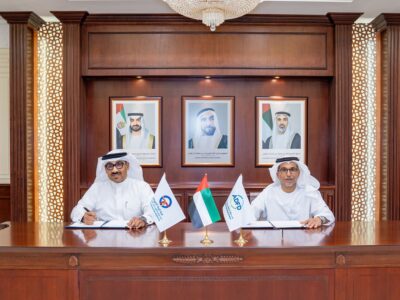Behind the doors of an unassuming warehouse in Dubai’s Al Quoz district, a quiet revolution is taking place. For the next generation of the city’s celebrated Alabbar family, one sector is coming sharply into focus — e-commerce.
“We have big shoes to fill,” says Rashid Alabbar, sitting alongside his sister Salama in the SIVVI.com office.
That may be an understatement, but the two young Emiratis are currently embarking on an ambitious bid to corner the local e-commerce market, one of the fastest-growing industries in the Gulf. And in doing so, they are treading a different path to their father Mohamed Alabbar, the renowned founder and chairman of Emaar Properties, the developer behind Burj Khalifa and Downtown Dubai.
“If we wanted to, we could have gone into real estate and it would have been a lot easier,” Rashid adds. “But we’re going in the opposite direction, doing something different and trying to make an impact.”
That impact is already starting to be felt. Back in the autumn of 2013, Salama Alabbar launched BySymphony.com, the online extension to Symphony, a high-end boutique located in The Dubai Mall’s Fashion Avenue. Less than six months later, Rashid founded SIVVI, a website that sells clothing and accessories from 130 high-street brands mainly to customers in the GCC. Both brands fall within the portfolio of Alabbar Enterprises, which also runs a variety of retail and food and beverage concepts across the Middle East, Africa and Asia.
An even bigger statement of intent came last week, when Alabbar Enterprises announced that it had taken a 4 percent stake in Yoox Net-a-Porter (YNAP) — the global online giant that owns six multibrand websites including Net-a-Porter.com — for more than $113m. When the deal was announced last Tuesday, YNAP chief executive Federico Marchetti said the cash would help fund increased localisation of content, especially in the Middle East.
Rashid says he expects both sides to benefit from the deal.
“As a family, our background legacy has always been about retail,” he explains. “So we just see this as a natural move. Digital is something that’s important to us, and the YNAP Group is a prestigious group with a great portfolio and great people.
“Maybe from a strategic point of view, we are a large retailer, so I’m sure there will be synergies that our group can give the YNAP Group. But relations have just started, and there are a lot of things we need to explore together with the YNAP team. For sure, the opportunities are endless, whether it’s in the markets they operate or other markets.”
Meanwhile, two years after their launch, Alabbar Enterprises’ own-brand websites are steadily gaining traction, recording as much as 30 percent growth month on month. Not that it’s been an easy journey, the two entrepreneurs say.

“It’s a very technical business,” says Salama. “For someone coming from retail, it’s quite a different feel — there’s a huge learning curve.
“And it’s very competitive as well. There are so many people offering the same product, so it’s about how you modify or provide services to make it more valuable for people to order from us. So whether that’s something like same-day or next-day delivery — we have to offer something that other websites can’t provide.”
E-commerce in the Gulf is proving to be big business. A report published by Payfort in 2015 put the value of the sector in the Middle East at $7bn, projecting that the industry would be worth up to $10bn in the UAE and Saudi Arabia alone by 2020. It also pointed out that in four years’ time, e-commerce would likely overtake aviation as the fastest-growing sector in the Gulf.
And if the global economy appears skittish at the moment, e-commerce has thus far been bullet-proof. Research published by Credit Suisse last week pointed out that “softening economic conditions might actually improve the relative competitive position of online operators, versus more traditional bricks-and-mortar companies”.
The region’s first tech unicorn, Dubai-based Souq.com, is an e-commerce platform, and has seen stratospheric growth over the past decade. Other than Souq, a whole host of other outfits, such as Namshi, MarkaVIP, Mumzworld and Wadi are also vying for market share, some of whom compete directly with SIVVI and BySymphony. Then there’s the abundance of global players — such as the aforementioned Net-a-Porter and ASOS, as well as the websites of the giant luxury brands themselves — who are also targeting the deep pockets of Gulf consumers.
Set against the level of competition, however, is the steadily increasing populations of the Gulf countries, the high youth demographic and the growing smartphone penetration. On the wall of the SIVVI warehouse hangs a sign that simply states: “Mobile first. Arabic first”. It’s a clear indication of where online trends are heading.
“I think e-commerce is a big enough market if you do it right, and I think we have been fortunate to learn a lot from the way other companies were launched,” Rashid says. “From what I read, a lot of these companies burnt a lot of money.
“At the beginning, however, we were very conservative — we didn’t invest a lot. We invested, I think, a good amount of money without going insane in terms of how much we were spending on marketing, hiring and so on. We didn’t hire 20 or 30 people all of a sudden and then fire them two months later, which we heard was happening elsewhere in the market.”
Aside from leveraging the experience of others, the two Alabbars also had a number of other advantages. For BySymphony, Salama was able to draw on her thorough experience of the luxury retail industry. Despite receiving several requests to open Symphony-branded stores in other countries around the world, she saw the website as a way to open up a much wider customer base.
“The look is different, and the feel is different,” she says. “A lot of people offer the brands that we do, but how we differentiate is the way we buy them. I know the client, and I kind of am the client, so I buy for the client. I know about fashion from my experience with Symphony so my speciality has been laying out everything exactly the way I as a customer would want to see it.

“Even before we opened the store, there was a huge hype about it, so that’s one of the things I am proud of — creating a brand out of nothing. That was a huge benefit for us when it came to the website as well.”
With a total of 70 brands on the site — mixing big names such as Balenciaga and Temperley with the best of local talent — BySymphony has garnered consumers from some fairly unexpected parts of the world. While the UAE unsurprisingly ranks top in terms of buyers, the US is second, followed by Saudi Arabia. The site also has a loyal following in Japan. The average transaction size on the website is $817— hardly surprising given the value of the products on offer – but some items retail for up to $20,000, and the biggest single transaction was “over AED100,000” ($27,200), Salama says.
“I think the way we buy is quite different, and that factors into why people come and buy at BySymphony,” she adds. “They know it might take a little longer to receive an item but they know we do things differently. That’s one of our selling points.
“We are quite selective about what we buy – for example, we buy more expensive things than some of the other websites, which are quite big and commercial. We are in-between an e-commerce platform and a boutique so we can take a bit more risk and I think that’s where we get those types of customers.”
For SIVVI, the story is a little different. By far the majority of customers (over 80 percent) come from the UAE and Saudi Arabia, and roughly 60 percent of transactions stem from an app that was launched last December. The average transaction size is smaller, at around AED400. Another advantage the firm has had is the family’s lengthy association with Singapore-based fashion retailer RSH, which has opened the door to new brands.
“That gave us, from an early age, an understanding of retail that is important to us, and also the relationships with brands that we try to leverage as much as we can,” Rashid says. “For example, we had worked with Mango in Asia. When we approached them, they told us that they had had many discussions with online shops here, but had concluded that it was a bit risky for their brand reputation.
“They gave us trust and started working with us. I think they liked the experience and therefore the doors opened to other players. So it gave us a first-mover advantage with some brands.”
SIVVI is now selling 130 brands through the Al Quoz warehouse and the number is growing all the time. This week, the firm is even introducing two of its own lines — one called High Streets, targeted at the female teen market, and one called Stock, for women in their 20s and early 30s.
“I was talking to my sister about ASOS — they had their own brand and started bringing others in,” Rashid explains. “I thought it was a good idea and thought I would try and understand fashion, work with partners and then — with time — plan to create my own brand.
“I see the trends and know what sells, so I can leverage that and expand the inventory I have for the style people want. It’s the first time for us, but I think we will be able to deliver a good product.”

For both companies, getting to grips with demanding local consumers has been a learning curve. Cash on delivery transactions are a big part of any regional e-commerce provider’s business, and Rashid says this has been the number one challenge, alongside ensuring that the right talent is in place, and taking care of the technical side.
“For the first eighteen months, it was a tough time,” Rashid says. “We were below the business plan and just tried to focus on what we should do right. It was more of a day-to-day operation — we weren’t even focused on the business.
“But after those 18 months of trying to find our path, we started to see the growth we heard about at all the e-commerce companies, so we’re growing quickly now. In our business plan, our aim is to break even in between three-and-half and four-and-a-half years, so that’s our target.”
This year, revenue generation is the number-one focus at SIVVI, while at BySymphony a raft of new brands may come onboard as soon as the bricks-and-mortar Symphony store moves to a larger location in The Dubai Mall. For Alabbar Enterprises as a whole, the firm is looking to expand over its full portfolio.
Another sister, Moza, who is chief executive of the company, looks after the food and beverage side of the business, which includes brands such as Hersheys and Social House. While that has its own plans to add new brands or acquire other companies, Rashid says e-commerce will play a starring role in the firm’s future.
“In developed economies, online as a percentage of total retail can go up to between 5 and 15 percent,” he says. “And I think here we’re not even at 2 percent. I think most of the growth, if we do things right, will come from these [online] entities. That’s my opinion, and that’s why both I and Salama are spending most of our time at these companies.”
The final advantage the brother-and-sister duo has — and perhaps the biggest — is the support of their father, the man who revolutionised the retail industry in Dubai.
“He’s been a huge support in terms of giving us hope,” Salama says. “He’s told us to stay positive and not be worried about taking risks. Don’t be worried about doing something you know nothing about — because at the end of the day, what he’s taught us is that you can always learn.”
“Sometimes, when times are tough and you feel a bit burnt out, he’ll give us a push and say ‘get up and go’,” Rashid agrees. “Even if at times you feel lost, it’s always helpful to have someone who is always supporting you.”
Given the resources and determination at their disposal, few would bet against the next generation of the Alabbar family matching the success of their forebears.








